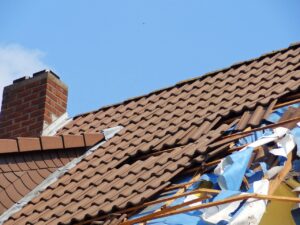Accidents are always waiting to happen on a construction site. Fortunately, they aren’t common, but if they do occur and there has been damage to the landowner’s property, the first question that is likely to be asked is “Who is liable for the cost of the repairs needed to be done?” The answer isn’t quite as straightforward as you might think.
In most cases, if a contractor was found to be responsible for damage at a construction site, e.g. a heavy object lifted by a crane somehow fell off and crashed through someone’s roof, then the contractor is most likely to be considered at fault. As long as the contractor was insured with commercial general liability insurance (CGL) policy, then compensation for the fault should ordinarily lie with the contractor. This liability to compensate for damage done by the contractor during a construction project extends to neighboring properties. For example, if a tree is being removed by a contractor on property X, but the tree falls on adjacent property Y and smashes into a side wall, causing damage to windows, then the contractor is ordinarily liable for the cost of the damage.
Contractors should be hired after checking their insurance cover
Damage to property during construction may be minor, but could also amount to hundreds or thousands of dollars worth of damage. The onus is on the property owner to check that whoever is going to do the construction work, renovations, or whatever it is, is licensed and insured for an amount that would cover all unforeseen eventualities during construction work. Unlicensed contractors may seem a cheap option to get things done, but if the worst happens, it is much harder to get them to pay compensation if they are not insured when an accident happens. The same goes for work done by friends or family. Your old buddy down the road may think that the job can be done just as well as a professional building contractor, but if an accident happens and property damage is done, then this puts your relationship and the value of your assets in a difficult situation.
Honest contractors normally honor their liability commitments
Responsible contractors, who are licensed and insured, will typically ensure that damage they do is rectified at their expense. In most cases, there should be no need for you, the property owner to make a claim with the contractor’s insurer. However, you will need to quantify the cost of the damage done to make sure that any compensation covers what needs to be done to rectify the damage and negotiate with the contractor to ensure that the contractor’s insurer pays up the full amount.
In some cases, the contractor may claim that the damage done was not the fault of the contractor and even put the blame on the property owner or legitimately claim that it was caused by a natural disaster. If, for instance, during the construction phase, a storm topples a tree on to your property and causes damage done to a part of the building that was being renovated or modified by the contractor, then this could be justifiable reason for the contractor to refuse to compensate the owner through their own liability insurance. If there is no doubt that the damage was not the fault of the contractor, then you, as the owner, may have to make a claim with your own homeowner’s insurance.
If there is a dispute about who was at fault for the damage, but you are confident you have evidence that the contractor was at fault, then you may have to sue the contractor. If it comes to this, you are strongly advised to seek legal help from a construction attorney to advise you about your legal options and act on your behalf in negotiating with the contractor and the contractor’s insurer.
Exceptions to contractor’s liability in Massachusetts
A recent Massachusetts Supreme Court case has determined that ordinary CGL liability insurance that most contractors will have does not cover defects made in construction, even though it still covers damage done by a contractor done during construction. To clarify what the court decision was based on, it centered on an insurance claim made by a couple in Marblehead, MA, who had hired a contractor to build their home. The homeowner was alarmed to discover serious defects that took place during the construction phase, amounting to what was considered to be $200,000 in costs to rectify. The Supreme Court decided that CGL insurance cover did not cover defects in construction, only damage done by the contractor to already correctly installed buildings. This meant that the case brought against the contractor by the homeowner failed.
The decision by the Supreme Court is generally aligned with cases in other jurisdictions, making it essential that both contractors and property owners consider their insurance options before beginning construction work. For contractors, it means that CGL liability cover cannot be used in the event that they are sued by a property owner for defective workmanship, even though CGL will cover them for any damage done to existing structures they are found to be responsible for if an accident happens. Because CGL can now no longer be used to compensate for defective work, the contractor becomes exposed to legal action against them for which they cannot claim against their own insurance policy unless they seek additional cover. Likewise, the property owner cannot expect the contractor who has been found to be responsible for serious defects in construction to readily pay compensation through their own insurance cover.
Because of the serious financial consequences that could arise from a dispute with a contractor resulting from construction faults or property damage done, it is advisable to contact a reputable Boston based construction lawyer for legal advice and representation.


